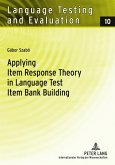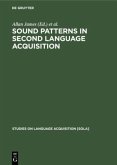Subjectivity, the speaker's expression of self in discourse, is a relatively under-researched area in the field of applied linguistics: this book examines the role of subjectivity in the context of second language use. Drawing on insights from discourse analysis and pragmatics, it describes how a group of students studying French at degree level at the University of Cambridge, England, convey expressions of subjectivity in personal narratives and argumentative language.
In this book, the author begins by introducing the reader to key areas in the study of discourse. Using a methodology that has much in common with descriptive linguistics, he provides a wide-ranging account of how forms in language are used to convey the expression of subjectivity. His particular concern is to examine how these markers of subjectivity are used differently by native and non-native speakers of French. The discussion is carefully supplemented throughout with a variety of exemplification and discourse types, including personal narratives in French and English and transcripts of video-taped interactions in role-plays.
In the course of his analysis, the author questions long-held assumptions about the way French is taught in secondary schools and in higher education institutions. The range of issues discussed, as well as the variety of examples used, will make this a valuable book not only for students of applied linguistics but also for any reader wishing to gain a deeper understanding of how the expression of subjectivity can contribute to the learning of a second language.
In this book, the author begins by introducing the reader to key areas in the study of discourse. Using a methodology that has much in common with descriptive linguistics, he provides a wide-ranging account of how forms in language are used to convey the expression of subjectivity. His particular concern is to examine how these markers of subjectivity are used differently by native and non-native speakers of French. The discussion is carefully supplemented throughout with a variety of exemplification and discourse types, including personal narratives in French and English and transcripts of video-taped interactions in role-plays.
In the course of his analysis, the author questions long-held assumptions about the way French is taught in secondary schools and in higher education institutions. The range of issues discussed, as well as the variety of examples used, will make this a valuable book not only for students of applied linguistics but also for any reader wishing to gain a deeper understanding of how the expression of subjectivity can contribute to the learning of a second language.








